
The Church of Saint John the Baptist is on the corner of West Derby Road and Green Lane, in Tuebrook, Liverpool, England. It is recorded in the National Heritage List for England as a designated Grade I listed building, and an active Anglican parish church in the Diocese of Liverpool, the archdeaconry of Liverpool and the deanery of West Derby.
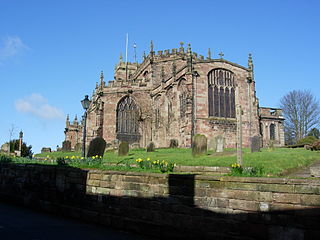
St Oswald's Church stands on the highest point in the market town of Malpas, Cheshire, England, on or near the site of a Norman motte and bailey castle. The church is recorded in the National Heritage List for England as a designated Grade I listed building and is recognised as being one of the best examples in Cheshire of a late 15th to early 16th-century church. It is an active Anglican parish church in the diocese of Chester, the archdeaconry of Chester and the deanery of Malpas. Its benefice is combined with those of St John, Threapwood, and Holy Trinity, Bickerton. Alec Clifton-Taylor includes it in his list of 'best' English parish churches.
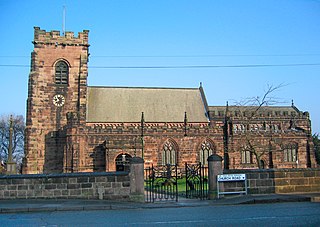
St Laurence's Church is in Church Road, Frodsham, Cheshire, England. The church stands, not in the centre of the town, but in the elevated area of Overton overlooking the town. It is recorded in the National Heritage List for England as a designated Grade I listed building. It is an active Anglican parish church in the diocese of Chester, the archdeaconry of Chester and the deanery of Frodsham.

St Mary's Church is an Anglican parish church in the village of Newbold Astbury, Cheshire, England. It is recorded in the National Heritage List for England as a designated Grade I listed building, and its architecture has been praised by a number of writers.
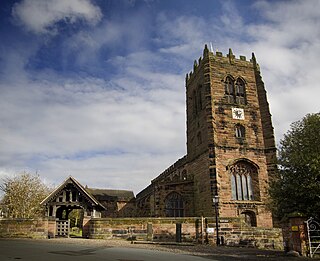
St Mary and All Saints Church is in the centre of the village of Great Budworth, Cheshire, England. It is an active Anglican parish church in the diocese of Chester, the archdeaconry of Chester and the deanery of Great Budworth. The church is recorded in the National Heritage List for England as a designated Grade I listed building. Clifton-Taylor includes it in his list of 'best' English parish churches. Richards describes it as "one of the finest examples of ecclesiastical architecture remaining in Cheshire". The authors of the Buildings of England series express the opinion that it is "one of the most satisfactory Perpendicular churches of Cheshire and its setting brings its qualities out to perfection".

St Bartholomew's Church is in the town of Wilmslow, Cheshire, England. The church is recorded in the National Heritage List for England as a designated Grade I listed building. It is an active Anglican parish church in the diocese of Chester, the archdeaconry of Macclesfield and the deanery of Knutsford.

St Nicholas Church is in the village of Burton, Ellesmere Port and Neston, Cheshire, England. It is recorded in the National Heritage List for England as a designated Grade II* listed building. It is an active Anglican parish church in the diocese of Chester, the archdeaconry of Chester and the deanery of Wirral South. Its benefice is combined with that of St Michael, Shotwick.

St Mary's Church in Cheadle, Greater Manchester, England, is a Grade I listed building. It is an Anglican parish church in the diocese of Chester, the archdeaconry of Macclesfield and the deanery of Cheadle. Its benefice is united with that of St Cuthbert.

St Werburgh's Church is the name of two separate churches in the village of Warburton, Greater Manchester, England. The older church is located to the west of the village, and may date back as far as the middle of the 13th century. It is now a redundant church but services are held in the summer months. The church is recorded in the National Heritage List for England as a designated Grade I listed building. The authors of the Buildings of England series call this church "a lovable muddle".

All Saints' Church is a 15th-century redundant church in the park of Harewood House, the seat of the Lascelles Earls of Harewood, near the village of Harewood, West Yorkshire, England. It is recorded in the National Heritage List for England as a designated Grade I listed building, and is under the care of the Churches Conservation Trust. The church stands in isolation within Harewood Park, as the surrounding village was relocated by the owner of Harewood House, in about 1760, to a location further from the house. Inside the church is the family vault of the Earls of Harewood and a set of six alabaster monuments, which are "the largest collection of alabaster monuments in a parish church within the dates 1419–1510".

St George's Church, Beckenham is the Church of England parish church of Beckenham, Greater London. It is Grade II* listed.

All Saints' Church, Kedleston, is a redundant Anglican Church approx. 4 miles [6km] north-west of Derby, and all that remains of the medieval village of Kedleston, demolished in 1759 by Nathaniel Curzon to make way for the adjacent Kedleston Hall, a country house in Derbyshire, England. It is recorded in the National Heritage List for England as a designated Grade I listed building. Kedleston Hall is owned by the National Trust, and the church is under the care of the Churches Conservation Trust. Kedleston Hall has been occupied by the Curzon family for over 700 years.
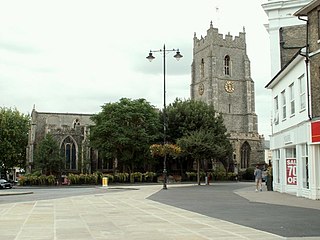
St Peter'sChurch, Sudbury is a former Anglican church in the town of Sudbury, Suffolk, England, which now serves as a cultural venue. The building is recorded in the National Heritage List for England as a designated Grade I listed building, and is under the care of the Churches Conservation Trust. The building stands in the heart of the town in a dominating position on Market Hill.

The Church of St Mary the Virgin is an Anglican church in Goosnargh, a village north of Preston in Lancashire, England. The church dates from the Middle Ages; it was enlarged in the 16th century and restored twice in the 19th century.

St Laurence's Church is in Union Street, Chorley, Lancashire, England. It is an active Anglican parish church in the deanery of Chorley, the archdeaconry of Blackburn, and the diocese of Blackburn. The church is recorded in the National Heritage List for England as a designated Grade II* listed building.

St James' Church is in the village of Brindle, Lancashire, England. It is an active Anglican parish church in the deanery of Chorley, the archdeaconry of Blackburn, and the diocese of Blackburn. The church is recorded in the National Heritage List for England as a designated Grade II listed building.
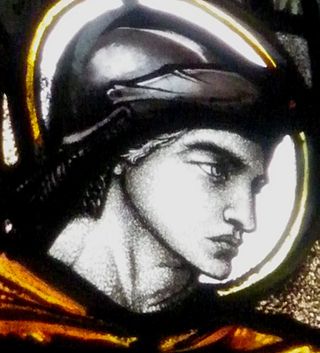
Rachel de Montmorency, née Rachel Marion Tancock, was an English painter and artist working in stained glass. She learned about stained glass when she worked for artist Christopher Whall in the 1910s and 1920s. During World War I she worked as a voluntary nurse.

St. Peter's Church is in the village of Edgmond, Shropshire, England. The church is an active Anglican parish church in the deanery of Edgmond and Shifnal, the archdeaconry of Salop, and the diocese of Lichfield. Its benefice is united with those of St Chad, Kynnersley, and St Lawrence, Preston upon the Weald Moors. The church is recorded in the National Heritage List for England as a designated Grade I listed building.

St Mary's Church stands on a hill in the town of Ellesmere, Shropshire, England. It is an active Anglican parish church in the deanery of Ellesmere, the archdeaconry of Salop, and the diocese of Lichfield. The church is recorded in the National Heritage List for England as a designated Grade I listed building.
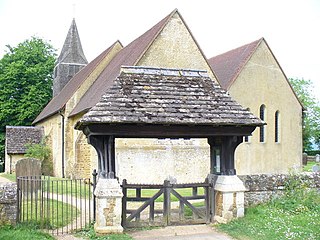
St James's Church stands on Abinger Lane in Abinger Common, a small village within the civil parish of Abinger in Surrey, south-eastern England. The church was built in the early 12th century and then rebuilt around 1220, and is today a grade II* listed building.



























